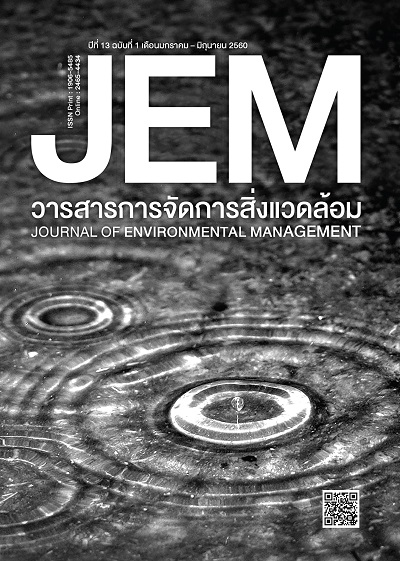ทัศนคติเกี่ยวกับค่าบำบัดน้ำเสียของประชาชนในพื้นที่กรุงเทพมหานคร PUBLIC ATTITUDE TOWARDS WASTEWATER TREATMENT FEES IN BANGKOK
DOI:
https://doi.org/10.14456/jem.2017.4บทคัดย่อ
การกำหนดให้ผู้ก่อความเสียหายแก่แหล่งน้ำธรรมชาติเป็นผู้รับผิดชอบในการเสียค่าใช้จ่าย เพื่อช่วยกันแก้ไขบรรเทาปัญหาเป็นไปตามหลักการ “ผู้ก่อมลพิษเป็นผู้จ่าย” จะนำไปสู่การควบคุมมลพิษและการฟื้นฟูระบบนิเวศน์ทางน้ำอย่างยั่งยืนบทความนี้มีวัตถุประสงค์ เพื่อศึกษาแนวทางการจัดเก็บค่าธรรมเนียมบำบัดน้ำเสียที่ปฏิบัติในต่างประเทศ และเพื่อศึกษาปัจจัยที่มีความสัมพันธ์กับการมีส่วนร่วมและความเต็มใจจ่ายค่าธรรมเนียมบำบัดน้ำเสียของประชาชนในกรุงเทพมหานคร โดยผลการวิจัยพบว่า การเพิ่มระดับการมีส่วนร่วมในการดูแลรักษาความสะอาดฟื้นฟูแหล่งน้ำ และการมีส่วนร่วมในการเสียค่าธรรมเนียมระบบบำบัดน้ำเสียนั้น ภาครัฐควรเปิดโอกาสให้ประชาชนที่เป็นผู้เกี่ยวข้องในฐานะผู้จ่ายค่าธรรมเนียมเข้ามามีส่วนร่วมในการกำหนดนโยบาย การนำนโยบายไปปฏิบัติและการประเมินผล เพื่อให้เป็นไปตามหลักการขับเคลื่อนการพัฒนาประเทศจากความร่วมมือของภาคประชาชนกับภาครัฐ
The Polluter Pays Principle (PPP), enacted to make the party contaminating natural water resources responsible for paying the compensation, aims to contain the pollution and to restore the sustainable water ecology. The objectives of this research were to study approaches to collecting waste water treatment fees practiced internationally and to study the factors related to the participation and willingness of Bangkok metropolitan residents regarding this matter. In order to increase the level of participation in preserving water resources and to encourage the payment of water treatment fees, the government should enable people, those that pay the fees, to participate in public policy formulation, implementation, and evaluation. This will ensure the principle of steering national development through the collaboration between the civic and government sectors.
เอกสารอ้างอิง
Aimjarean, M. (2001). Legal Problem Related to Waste Water User Charged by Bangkok Metropolitan Administration [In Thai]. Unpublished Master’s thesis, Ramkhamhaeng University.
Bangkok Metropolitan Administration, Bureau of Budget. (1997). Manual of Account for Metropolitan Administration. Bangkok: Kansasana Publishing.
Burikul, T. (2005). Participation: Concepts, Theories and processes [In Thai]. Bangkok: Panich Phranakorn.
Cronbach, L. J. (1970). Essential of Psychological Test. New York: Harper and Row Publishers.
Department of Drainage and Sewerage. (2016). Water Quality Management in Bangkok. Retrieved January 24, 2016, from dds.bangkok.go.th/indexdds.htm
Department of Pollution Control. (2014). A Manual of Wastewater Treatment Fee. Retrieved February 19, 2014, from http://www.pcd.go.th/download/regulation.cfm
Field, B. C. (1994). Environmental Economics: An Introduction. Singapore: McGraw-Hill.
Jhermpun, S. (2014). Management Fee to Wastewater Treatment Sto rage on Polluter Pays. Principle of Thailand [In Thai]. Journal of Environmental Management 10(1), 105 – 127.
Jhermpun, S. & Panyasiri, C. (2015). Occupation and Employment Promotion of the Disabled in Thailand: Preparation for the ASEAN Community [In Thai]. Journal of Social Development, 17(2), 113 – 143.
Jhermpun, S. & Panyasiri, C. (2016). Factors Affecting Participation and Willingness of the Bangkok Citizens in Paying Waste Water Treatment Fee [In Thai]. Final research report, Siam University.
Kanjanajittra, S., Jhermpun, S., & Juncharean. K. (2012). Project of Survey and Study of Perspective and Opinion of People in Wastewater Treatment Charge [In Thai]. Bangkok: Metropolitan Waterworks Authority.
Kongsakul, S. (2006). Willingness to Pay for Wastewater Treatment System from household of People in Nakhon Pathom’ Municipality [In Thai]. Unpublished Master’s thesis, National Institute of Development Administration.
Lapiratanakul, V. (2003). Public Relations. Bangkok: Chulalongkorn University.
OECD. (1982). Economic Instrument for Environment Protection. Paris: OECD
Local Administrative Organization Decentralization Planning and Procedural Act (1999) [In Thai]. In Royal Government Gazette, 116, Part 114 Kor, dated November, 17, 1999 (pp. 48 – 66). Retrieved on June 16, 2016, from www.Rachakitcha.soc.go.th/RKJ/announce/search.jsp
National Environmental Quality Enhancement and Preservation Act (1992). [In Thai]. In Royal Government Gazette, 109, part 37, dated November, 17, 1999 (pp.1 – 43). Retrieved on January 11, 2016, from www.Rachakitcha.soc.go.th/search_result.php
National Statistical Office. (2016). The Household Socio-Economic Survey. Retrieved June 11, 2016, from http://service.nso.go.th
Panyasiri, C. (2016). The Paradigm Shift of Public Administrati on in Thai Bureaucracy : A Comparative Case Study between Government Agencies and Public Enterprises [in Thai]. Journal of Thonburi University, 10(21), 9 – 19.
Pilun-Owad, O. (2003). Persuasive Communication [In Thai]. Bangkok: Chulalongkorn University.
Pollution Control Department. (2004). A Total Garbage Management for Community: A Manual for Local Administrative Managers [In Thai]. Bangkok: Khurusapha Printing.
Prasithrathsint, S. (2004). Research Methodology for Social Sciences [In Thai]. Bangkok: Feaung Fa Printing.
Punyaratabhandhu, S. (2003). Reseach Methodology for Public Administration [In Thai]. Bangkok: Sema Dhamma.
Prasithrathsint, S. (2004). Research Methodology for Social Sciences [In Thai]. Bangkok: Feaung Fa Printing.
Suwan, P. (1977). Attitude: Change Measure and Behavioral Health [In Thai]. Bangkok: Thaiwattanapanich.
Varanusantikul, S. (2007). Social Psychology: Theories and Applications [In Thai]. Bangkok: Med-Sai Printing.
Vinijnaiyapak, N. (2015). The Direction of Thai Public Administration [In Thai]. In S. Punyaratabandhu (Ed.), Public Administration in Thailand : Change, Development, and Direction (pp. 183 – 184). Bangkok: Sukhumwit Media Marketing.
United Nations. (2000). Wastewater management policies and practices in Asia and the Pacific: Water resources series No. 79 . New York: United Nations.
United Nations Environment Programme. (1997). Global Environment Outlook. London: United Nations Environment Programme.
United State Agency for International Development. (2006). Centralized wastewater treatment plants in Indonesia. Final project report, DAI Project Number: 5300201, Environmental Services Program, United State Agency for International Development. Retrieved January 24, 2016, from http://pdf.usaid.gov/pdf_docs/Pnadl920.pdf
Yamane, T. (1973). Statistics: An Introduction Analysis. New York: Harper and Row.



